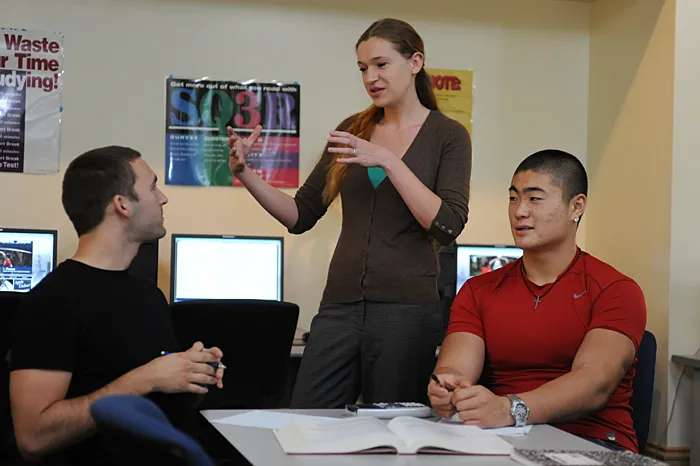
Keira Hambrick, the Assistant Director of Tutoring Services at Marietta College, was recently awarded the designation of a Level 3 Certified Learning Center Professional by the National College Learning Center Association (NCLCA).
The NCLCA offers four levels of Learning Center Leadership Certification that individuals can apply for based on their years of experience in learning assistance and their knowledge about and commitment to the profession.
Always one to think about how she can help further develop the Academic Resource Center’s tutoring programs, Hambrick saw the certification application process as a great way to reflect on and show her commitment to the tutoring programs.
“A large part of why I decided to go through the application process was because when students associate me with the tutoring and writing centers, I want them to know I care a lot about my work and helping them with their overall success,” she said.
For Hambrick, finding the time to reflect on her career in the learning assistance field adequately may have been difficult, but she said the experience allowed her to acknowledge the positive growth and advancement of the tutoring programs and reinvigorated her to keep working to improve them.
Hambrick has been supporting student success and striving to strengthen the tutoring centers long before she received this prestigious certification.
“Being a Marietta College graduate is very meaningful to me,” she said. “I tutored here when I was a student, and although I can’t recall the exact day, I remember thinking after a great tutoring session in the Writing Center, ‘wouldn’t it be great if I could direct the Writing Center some day.’ I know it’s a cliché, but it does seem like a dream come true. It has been a transformational experience. I saw getting certified as a way to give back to the institution, to elevate the tutoring programs and help make the tutoring experience transformational for other students.”
Actively supporting the tutoring staff is a primary strategy Hambrick uses to try and assist the student body as a whole.
Following the certification of the tutoring programs by the College Reading & Learning Association (CRLA) in 2016, Hambrick has strived to offer student tutors opportunities to take part in training sessions and further develop their skills as a tutor.
“The CRLA has only certified 1,100 colleges worldwide,” Hambrick said. “With this designation, students can expect to meet with someone who knows different learning styles, how to address barriers to learning, different active learning strategies, is culturally sensitive and is a competent communicator.”
Looking ahead, Hambrick hopes to persuade more students to try out tutoring, both as a tutor and as someone seeking assistance.
“For the students considering being a tutor, I’d like for them to see this as a rewarding opportunity offering training and professional development,” Hambrick said. “I want to continue to lead by example and demonstrate that this professional development can be really valuable.”
Such useful development includes retaining CRLA certification after graduation. Recent alumni have leveraged their certification while in graduate school, using it to demonstrate their experience and to be hired as tutors on their new campuses. Others, Hambrick said, who do not plan on going to graduate school are still able to strengthen some of the most coveted job skills, including working through challenges and effectively communicating complex topics, when they work as a tutor.
Hambrick heavily invests in the tutoring staff in the hopes that the students will see it as a high-level, free resource on campus and will benefit from using it.
“I want to reduce the stigma about tutoring,” she said. “I strongly disagree with the assumption that being in a tutoring space demonstrates one is not competent enough. We all use our strengths to learn as well as we can and apply them to anything and everything we do, including classes. Tutoring can help with this personal growth and in turn, help you perform better in classes.”